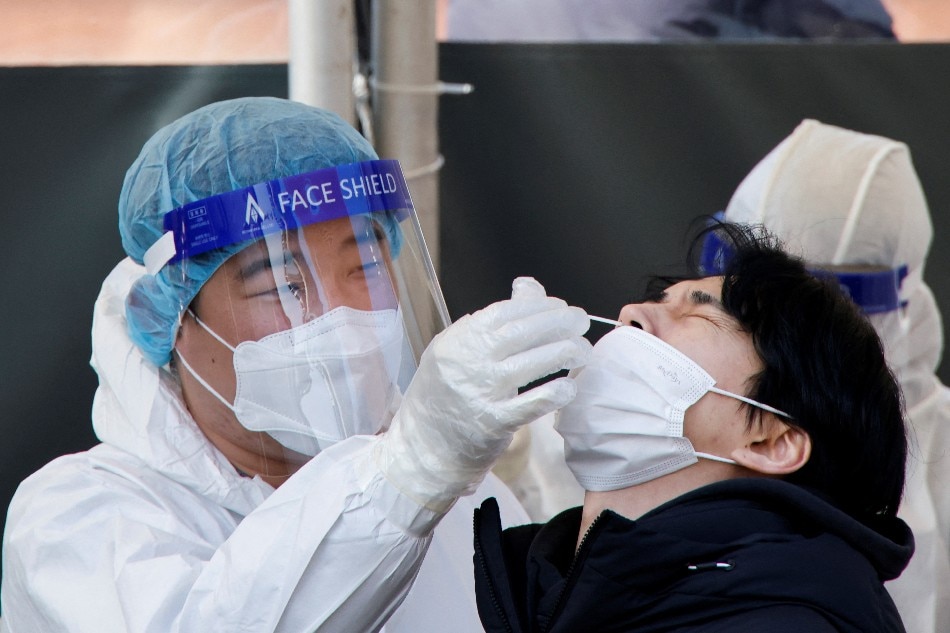South Korea says omicron 75 pct less likely to kill than delta | ABS-CBN
ADVERTISEMENT

Welcome, Kapamilya! We use cookies to improve your browsing experience. Continuing to use this site means you agree to our use of cookies. Tell me more!
South Korea says omicron 75 pct less likely to kill than delta
Hyonhee Shin,
Reuters
Published Feb 22, 2022 03:50 PM PHT
SEOUL — People infected with the omicron coronavirus variant are nearly 75 percent less likely to develop serious illness or die than those who contract the delta variant, real world data released on Monday by South Korea's health authorities showed.
SEOUL — People infected with the omicron coronavirus variant are nearly 75 percent less likely to develop serious illness or die than those who contract the delta variant, real world data released on Monday by South Korea's health authorities showed.
A study by the Korea Disease Control and Prevention Agency (KDCA) of some 67,200 infections confirmed since December showed the omicron variant's severity and death rates averaged 0.38 percent and 0.18 percent, respectively, compared with 1.4 percent and 0.7 percent for the delta cases.
A study by the Korea Disease Control and Prevention Agency (KDCA) of some 67,200 infections confirmed since December showed the omicron variant's severity and death rates averaged 0.38 percent and 0.18 percent, respectively, compared with 1.4 percent and 0.7 percent for the delta cases.
The KDCA classed severe cases as people who were hospitalized in intensive care units.
The KDCA classed severe cases as people who were hospitalized in intensive care units.
Around 56 percent of 1,073 people who died over the past 5 weeks were either unvaccinated or had received only 1 dose, the study showed, with people aged 60 or older accounting for 94 percent of deaths.
Around 56 percent of 1,073 people who died over the past 5 weeks were either unvaccinated or had received only 1 dose, the study showed, with people aged 60 or older accounting for 94 percent of deaths.
ADVERTISEMENT
More than 86 percent of South Korea's 52 million population have been double vaccinated and nearly 60 percent have received a booster shot.
More than 86 percent of South Korea's 52 million population have been double vaccinated and nearly 60 percent have received a booster shot.
South Korea had kept cases and deaths relatively low thanks to widespread social distancing measures and aggressive testing and tracing.
South Korea had kept cases and deaths relatively low thanks to widespread social distancing measures and aggressive testing and tracing.
The omicron variant has led to a surge in cases - daily new infections topped a record 100,000 last week - but authorities have pushed ahead with slightly easing social distancing rules amid the lower fatality rate and ahead of a presidential election next month.
The omicron variant has led to a surge in cases - daily new infections topped a record 100,000 last week - but authorities have pushed ahead with slightly easing social distancing rules amid the lower fatality rate and ahead of a presidential election next month.
Contact tracing and mandatory isolation for vaccinated people was scrapped in favor of self diagnosis and at-home treatment to free up medical resources. Among changes to strict curfews, restaurants will be open for an extra hour for groups of up to 8 diners, up from 6.
Contact tracing and mandatory isolation for vaccinated people was scrapped in favor of self diagnosis and at-home treatment to free up medical resources. Among changes to strict curfews, restaurants will be open for an extra hour for groups of up to 8 diners, up from 6.
The long-running curfews have emerged as a political hot potato ahead of the election, with small business owners urging them to be lifted while some experts warn of likely strain on the medical system.
The long-running curfews have emerged as a political hot potato ahead of the election, with small business owners urging them to be lifted while some experts warn of likely strain on the medical system.
The KDCA said omicron became the dominant variant in the third week of January and up to 90 percent of new cases were omicron by the first week of February.
The KDCA said omicron became the dominant variant in the third week of January and up to 90 percent of new cases were omicron by the first week of February.
The KDCA reported 99,444 new cases for Monday, bringing total infections to 2,157,734, with 7,508 deaths.
The KDCA reported 99,444 new cases for Monday, bringing total infections to 2,157,734, with 7,508 deaths.
RELATED VIDEO
Read More:
ANC
South Korea
Seoul
COVID-19
COVID19
coronavirus
omicron
delta
COVID-19 omicron variant
COVID-19 delta variant
ADVERTISEMENT
ADVERTISEMENT



